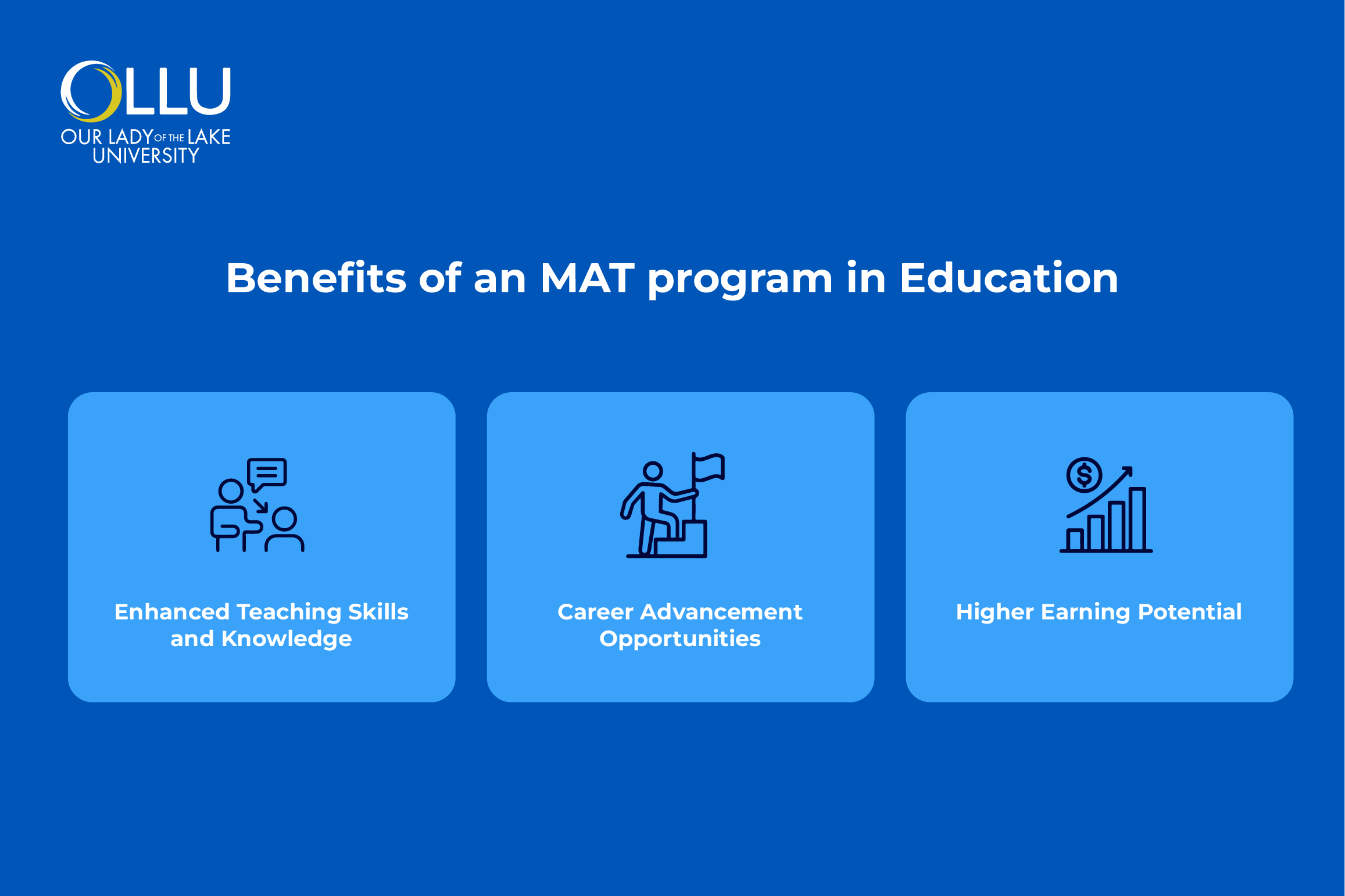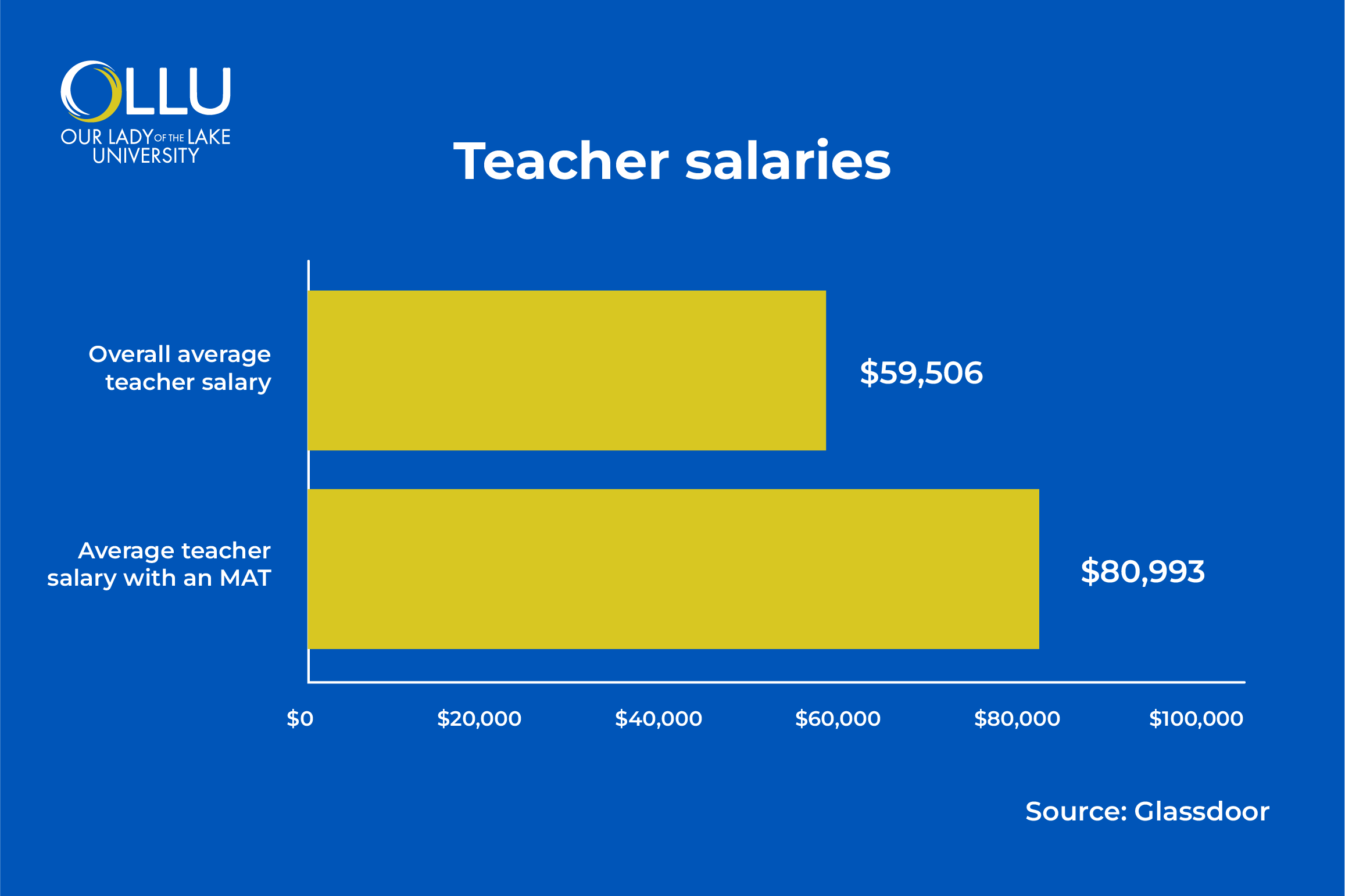What Is an MAT Program in Education? Key Insights
Jan 09, 2025

Key Takeaways
- An MAT program is designed for individuals who want to pursue a career in teaching or advance their skills in education.
- MAT graduates gain specialized knowledge, preparing them for diverse teaching roles, including classroom teacher, special education teacher, or reading coach.
- With a master's degree, MAT graduates are eligible for higher-paying positions compared to teachers with only a bachelor's degree.
- An MAT opens up non-classroom career opportunities, such as educational consultant, instructional coordinator, or corporate trainer, for those seeking to apply their teaching expertise outside traditional roles.
They say that teachers change lives, and anyone who's passionate about education understands the truth in that statement. Teaching is not just about imparting knowledge; it's inspiring students to reach their fullest potential—academically and beyond.
For those interested in this role, the drive to always improve themselves and evolve as an educator is key, and pursuing a Master of Arts in Teaching (MAT) program can certainly help with that.
But what is an MAT program in education? Well, it might just be the degree that changes your life—and the lives of those you teach.
What Is an MAT Program?
A Master of Arts in Teaching program is a graduate-level degree focused on preparing students for careers in teaching or helping them further develop their knowledge and skills in this area. It is generally meant for individuals with a bachelor's degree in a field relevant to education, though some might be more flexible and tailored to people looking to transition into teaching.
MAT Program Requirements
Like with a majority of education programs, there are prerequisites to enrolling into an MAT program as well as requirements to complete throughout the program in order to graduate.
Admission requirements for an MAT program
At OLLU, the MAT program prerequisites include a bachelor's degree and several other criteria, such as:
- A cumulative GPA of at least 2.75 (on a 4-point scale) in their undergraduate studies, with a 3.0 for the last 60 credit hours of coursework
- Depending on the certification area, applicants need to have a certain number of credit hours in the subject they wish to teach. For example, those applying for math or science certification (grades 7-12) need 15 credit hours in their subject area.
- If applicants do not meet the GPA or subject hour requirements, they may need to take and pass a Pre-Admission Content Test (PACT)
It's important to note that specific MAT programs may have additional or slightly different requirements, so it's always a good idea to contact the admissions office of the program you're interested in to confirm the full set of requirements.
Curriculum and coursework in an MAT program
The curriculum of an MAT program is structured to equip students with both theoretical knowledge and practical teaching experience. These programs combine core courses in teaching methods, classroom management, and educational theory with specialized coursework in various subject areas. This balanced approach prepares students to meet the demands of modern classrooms.
At OLLU, the MAT program offers four distinct specializations that cater to different interests and career goals:
- Elementary with Bilingual Education Certification: Focusing on bilingual language development and teaching strategies for students in dual-language classrooms. Students learn how to cultivate both bilingualism and biliteracy, with a particular focus on the social and cultural aspects of language learning.
- Elementary with ESL Certification: Preparing students to work with English language learners, teaching them second-language acquisition strategies and how to design and evaluate ESL programs.
- Elementary with Special Education Certification: Teaching students how to address the needs of students with disabilities, focusing on intervention techniques, behavioral analysis, and the ethical and legal considerations in special education.
- Secondary or All-Level Certification with ESL Certification: Designed for those who want to teach middle and high school students (grades 4-12) in diverse subjects like math, science, and language arts, with an emphasis on ESL education.
OLLU's MAT program also includes specialized courses like:
- Trends and Issues in Multicultural Education
- Curriculum and Instruction in Multicultural Settings
- Reading and Writing Assessment
- Instruction and Assessment Practices for the Multicultural Classroom
- First and Second Language Development and Acquisition
- Classroom Organization and Management for Multicultural Settings
These courses help future teachers develop a well-rounded, inclusive approach to teaching that takes into account the diversity of their students and equips them with the skills to handle various educational challenges.
Program duration and study options
MAT programs usually take about 1 to 2 years to complete. The reason for this timeframe is that the program needs to balance both academic coursework and practical teaching experience.
However, the duration largely depends on whether students attend full-time or part-time.
Benefits of an MAT Program in Education

Pursuing higher education, especially at the graduate level, offers numerous benefits
that extend beyond the academic advancement achieved by earning a master's degree.
Enhanced teaching skills and knowledge
One of the most obvious benefits of earning an MAT is the enhancement of your teaching skills and knowledge. While a bachelor's degree in education provides the essential foundation for teaching, a master's degree focuses much more on specialized areas, refining your skills and preparing you to address the diverse needs of today's students.
Through an MAT program, educators gain a much deeper understanding of advanced teaching techniques, curriculum development, student psychology, and classroom management, among many other things. This specialized training helps them become more effective in the classroom as well as better at tackling the challenges of modern education.
Career advancement opportunities
With a master's degree, educators are also eligible for a wider range of career opportunities compared to those who only hold a bachelor's degree.
The MAT degree can unlock access to higher-level roles that typically come with more responsibilities, greater influence in educational settings, and increased job satisfaction.
Higher earning potential

Graduate degrees are often associated with higher earning potential. This is because a master's degree represents an investment of time, money, and effort, making you more qualified and competitive in the job market. The specialized knowledge and advanced skills gained through a master's program enable educators to step into more senior roles, which typically come with higher salaries.
According to recent data, the average estimated total pay for a teacher in general, including ones that only hold a bachelor's degree, is $59,506 per year. However, for a teacher with a master's degree, the average rises significantly to $80,993 per year—a difference of over $21,000 annually.
Career Opportunities With an MAT Degree
While MAT programs are designed primarily to prepare educators for classroom teaching, their benefits exceed traditional teaching roles. The knowledge, skills, and advanced techniques developed in an MAT program provide graduates with the flexibility to pursue a range of careers both inside and outside the classroom.
Teaching careers with an MAT degree
The most direct path for MAT graduates is still to pursue teaching careers. With such a degree, graduates can teach in various roles and levels, including:
Classroom teacher
Whether you choose to work in elementary, middle, or high school, an MAT gives you the tools to design effective lesson plans, engage with students from diverse backgrounds, and address their individual needs. You'll be prepared to handle classroom challenges and create a learning environment that promotes student success.
Special education teacher
This role focuses on supporting students with disabilities or special needs and requires specialized expertise in tailored educational approaches. MAT graduates with a specialization in special education are well-equipped to pursue these positions. They possess a deep understanding of instructional strategies, behavioral management, and individualized educational plans (IEPs).
Reading or literacy coach
For those interested in helping students improve their reading and literacy skills, an MAT program prepares graduates to take on the role of a reading coach. This position often involves working with teachers and students to improve literacy instruction and assessment methods.
With an MAT degree, teachers are also better positioned for higher teaching positions or leadership roles in their school or district, such as department heads, who aren't directly tied to classrooms but still work closely with them.
Non-classroom roles for MAT graduates
In addition to traditional teaching roles, MAT graduates have the option to pursue a wide range of non-classroom careers within and outside the education sector. These positions often involve applying teaching expertise in different contexts or organizational settings. Some of these non-classroom career paths include:
Educational consultant
MAT graduates with pedagogy and curriculum design expertise can work as consultants for schools or educational organizations. They may advise on curriculum development, instructional practices, or educational policies, helping institutions improve student outcomes and teaching effectiveness.
Instructional coordinator
This role involves overseeing and developing curricula and educational programs for schools or districts. Instructional coordinators ensure that teaching methods align with educational standards and student needs. With an MAT, you'll be equipped to design innovative instructional materials and strategies that enhance student learning on a broader scale.
Corporate trainer or learning development specialist
Many MAT graduates transition into the corporate world, where they can apply their teaching skills to training and development programs for employees. This role involves designing educational programs to improve employee skills and knowledge within a company, making it a great fit for those who want to leave the classroom but continue working in educational contexts.
Educational publisher or author
For those interested in content creation, an MAT can lead to roles in educational publishing, where graduates can develop textbooks, workbooks, or digital content aimed at students and teachers. Writing educational materials or working for educational media outlets is a rewarding career path for those with a passion for learning and sharing knowledge.
Policy analyst
Some MAT graduates choose to work in the public sector or non-profits, analyzing and advising on educational policies. In this role, you could use your teaching background to advocate for changes in education law, provide data-driven insights, and contribute to the development of more effective educational programs at a systemic level.
Is an MAT Program Right for You?
Whether an MAT program is right for you is a highly personal decision and something only you decide, knowing better than anyone what your long-term goals, interests, and commitments are.
Generally, if you're passionate about teaching and interested in deepening your knowledge in education, an MAT could be a great fit. Some other signs that an MAT program might be for you are also:
- You feel a strong desire to make a difference in students' lives and are committed to honing your teaching skills.
- You already have a bachelor's degree and wish to further your education to become a certified teacher.
- You aim to pursue leadership roles in education, such as instructional coordinator, educational consultant, or special education teacher.
- You're interested in specialized fields, such as bilingual education, ESL, or special education.
- You're seeking advanced coursework and possibly even field experiences.
The Bottom Line
As cheesy as it might sound, teachers truly are the ones who shape the future. They are the ones guiding and teaching the next generation of leaders, doctors, lawyers, and innovators. Every lesson, every interaction, and every moment in the classroom has the potential to spark something in a student that will propel them toward greatness.
At OLLU, we understand the weight of this responsibility and are committed to providing you with the resources, expertise, and support you need to evolve as an educator through our Master of Arts in Teaching program.
To truly give your students the best education, you must first receive it yourself. That's why we focus on helping you continuously learn, grow, and refine your skills—ensuring that you, too, can inspire and lead the way for your students.
Frequently Asked Questions (FAQs)
What is the difference between an MEd degree and an MAT degree?
Though both lead to careers related to education, there is a big difference between an MEd and an MAT degree. The MEd (Master of Education) is typically broader and focuses on educational leadership, administration, and curriculum development, while an MAT focuses more on preparing individuals for teaching careers, specifically in the classroom.
How much does an MAT program typically cost?
The cost of an MAT program depends on the school, but it typically ranges from $15,000 to $40,000 for the entire program. It's important to research specific institutions for more accurate cost estimates as well as available financial aid options.